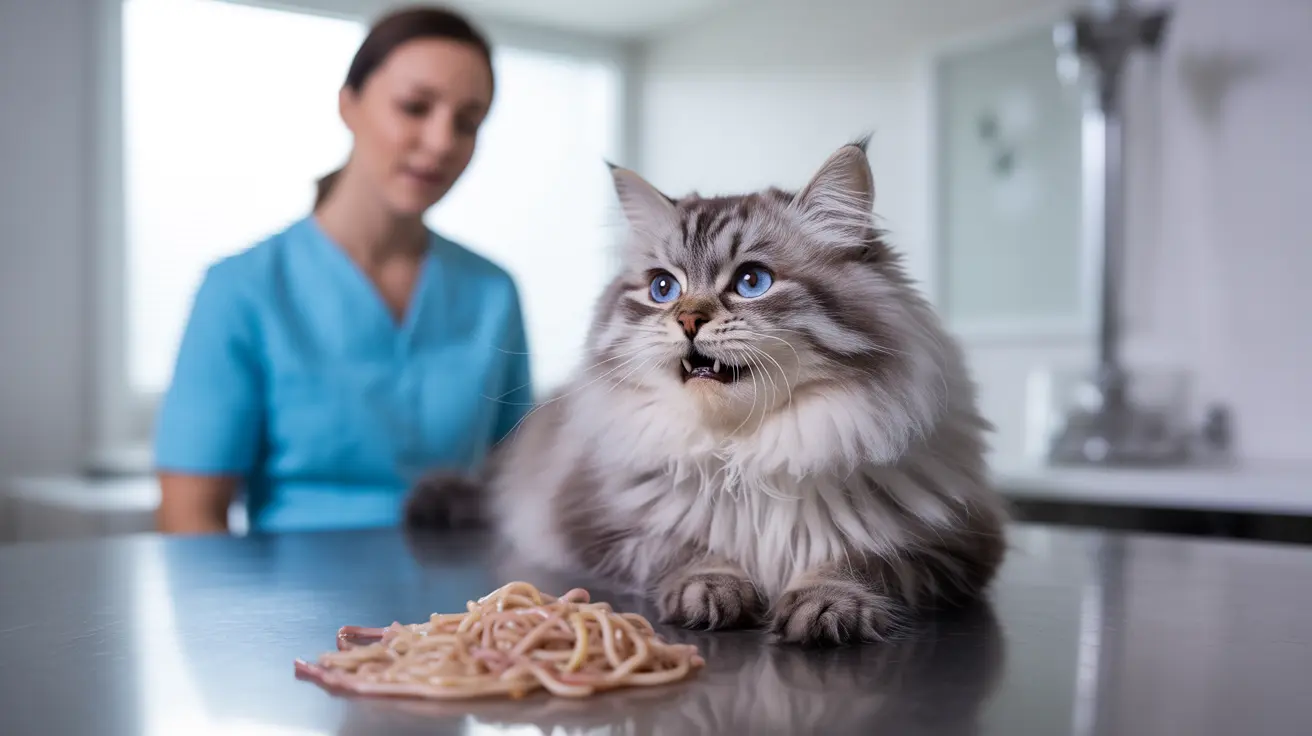Discovering your cat vomiting worms can be alarming for any pet owner. This concerning symptom is a clear indication of parasitic infection that requires immediate veterinary attention. Understanding the causes, risks, and treatment options is crucial for your cat's health and your family's safety.
In this comprehensive guide, we'll explore everything you need to know about cats vomiting worms, including identification, treatment options, and preventive measures to keep your feline friend healthy.
Understanding Why Cats Vomit Worms
When a cat vomits worms, it's typically due to a heavy intestinal parasite infestation. The most common culprits are roundworms, which appear as spaghetti-like creatures in the vomit. These parasites can multiply rapidly in your cat's digestive system, leading to various health complications.
Cats can become infected through multiple routes, including:
- Ingesting infected prey animals
- Contact with contaminated soil or feces
- Mother's milk (in kittens)
- Grooming after contact with contaminated environments
Common Types of Worms in Cats
Roundworms
Roundworms are the most frequently seen parasites in cat vomit. They're long, white, and cylindrical, resembling cooked spaghetti. These parasites can grow up to several inches long and commonly affect kittens.
Tapeworms
While less commonly seen in vomit, tapeworms may occasionally be expelled this way. They're typically identified by small, rice-like segments around the cat's anal area or in their feces.
Signs and Symptoms of Worm Infestation
Beyond vomiting worms, infected cats may display several other symptoms:
- Distended or bloated abdomen
- Weight loss despite normal appetite
- Diarrhea or changes in stool
- Poor coat condition
- Lethargy and weakness
- Visible worm segments in feces
Treatment Options for Cats with Worms
Professional veterinary treatment is essential when your cat is vomiting worms. The typical treatment protocol includes:
- Deworming medication prescribed by a veterinarian
- Follow-up treatments to ensure complete elimination
- Supportive care for dehydration or other symptoms
- Regular monitoring and fecal testing
Preventing Worm Infestations
Prevention is always better than cure. Here are essential preventive measures:
- Regular deworming according to veterinary recommendations
- Keeping litter boxes clean and sanitized
- Limiting outdoor access and hunting opportunities
- Regular veterinary check-ups and screenings
- Maintaining good household hygiene
Health Risks to Humans
Some worms that infect cats can also pose risks to humans, particularly children. These parasites can cause conditions like visceral larva migrans or ocular larva migrans. Practicing good hygiene and promptly treating infected cats helps protect the entire household.
Frequently Asked Questions
Why is my cat vomiting worms and what types of worms could they be?
Cats typically vomit worms due to heavy parasitic infections, most commonly roundworms. These appear as spaghetti-like creatures in the vomit. Less commonly, tapeworms might also be present. This condition indicates a significant infestation requiring immediate veterinary attention.
How do veterinarians diagnose and treat worm infestations in cats that cause vomiting?
Veterinarians diagnose worm infestations through physical examination, fecal testing, and assessment of symptoms. Treatment typically involves prescription deworming medications, possibly combined with supportive care for symptoms like dehydration or malnutrition.
What are the health risks for my cat and family if the cat vomits worms?
Worm infestations can cause serious health issues in cats, including malnutrition, dehydration, and organ damage. Some parasites can also infect humans, particularly children, causing conditions like larva migrans. Prompt treatment and good hygiene are essential for everyone's safety.
How can I prevent my cat from getting intestinal worms that lead to vomiting?
Prevention involves regular deworming treatments, maintaining clean living areas, limiting outdoor access, and prompt removal of feces. Regular veterinary check-ups and preventive medications are also crucial components of prevention.
When should I take my cat to the vet if it is vomiting worms or shows related symptoms?
Take your cat to the vet immediately if you observe worms in vomit or feces, or notice symptoms like lethargy, bloated abdomen, weight loss, or changes in appetite. Early intervention leads to better outcomes and prevents potential complications.
Conclusion
While discovering worms in your cat's vomit can be distressing, understanding the causes and knowing when to seek veterinary care is crucial. With proper treatment and preventive measures, you can help ensure your cat stays healthy and worm-free. Remember that prompt action not only protects your pet but also safeguards your family's health.






